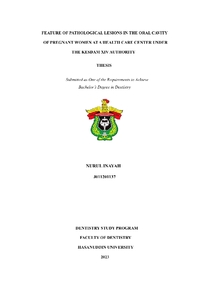Inayah, Nurul (2023) FEATURE OF PATHOGICAL LESIONS IN THE ORAL CAVITY OF PREGNANT WOMEN AT A HEALTH CARE CENTER UNDER THE KESDAM XIV AUTHORITY = FEATURE OF PATHOGICAL LESIONS IN THE ORAL CAVITY OF PREGNANT WOMEN AT A HEALTH CARE CENTER UNDER THE KESDAM XIV AUTHORITY. Skripsi thesis, Universitas Hasanuddin.
![[thumbnail of cover]](/36997/1.hassmallThumbnailVersion/J011201137_skripsi_15-02-2024%20Cover1.jpg)

J011201137_skripsi_15-02-2024 Cover1.jpg
Download (69kB) | Preview
J011201137_skripsi_15-02-2024 Bab 1 - Bab 2.pdf
Download (1MB)
J011201137_skripsi_15-02-2024 Dapus.pdf
Download (15MB)
J011201137_skripsi_15-02-2024.pdf
Restricted to Repository staff only until 23 November 2026.
Download (17MB)
Abstract (Abstrak)
Background: Dental and oral health can be influenced by several factors such as heredity, environment, behavior and oral health services. Poor dental and oral hygiene is also often found in pregnant women which can affect pregnancy such as premature birth, low birth weight and preeclampsia. Hormonal changes during pregnancy are usually accompanied by changes in eating patterns that trigger increased stress. Therefore, pregnant women tend to ignore their oral health. This situation is caused by an increase in the hormones estrogen and progesterone during pregnancy which is accompanied by plaque that sticks to the teeth due to morning sickness and vomiting (morning sickness). The hormones estrogen and progesterone can worsen gingival edema and increase gingival vascular permeability, thereby affecting gingival microvascularization and causing an excessive response to local irritants. Purpose: to determine the incidence of pathological lesions of the oral cavity that occur in pregnant women. Metode: the method used is a descriptive observational method. Result: data collection from the research showed that from all trimesters, trimester 1 (4.86%), trimester 2 (11.34%) and trimester 3 (11.43%) aged 20-37 years met the criteria and were cooperative. The number of participants in this study was 54 pregnant women. Conclusion: There is no description of the incidence of pathological lesions that occur in pregnant women. However, changes in taste were found. This change in taste may be caused by pregnancy patterns, for example morningsickness. This needs to be researched further.
| Item Type: | Thesis (Skripsi) |
|---|---|
| Uncontrolled Keywords: | Oral Cavity, Pregnant women, Pathological Lesions |
| Subjects: | R Medicine > RK Dentistry |
| Divisions (Program Studi): | Fakultas Kedokteran > Pendidikan Dokter |
| Depositing User: | Unnamed user with username pkl |
| Date Deposited: | 05 Sep 2024 02:49 |
| Last Modified: | 05 Sep 2024 02:49 |
| URI: | http://repository.unhas.ac.id:443/id/eprint/36997 |


